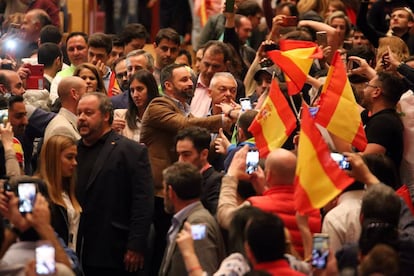Brussels fears Spanish election may not end political instability
The EU is hoping for a “stable” majority after nearly five years without solid governments, says one high-ranking official

Elections are one of those defining moments in the history of a country. Spain is viewing the general election of April 28 as some sort of second democratic Transition, following a decade of recession that left lingering scars in the form of unemployment and inequality. There is also the biggest political crisis in 40 years to contend with – Catalonia – as well as a new and imperfect five-way party system that is going to turn parliament on its head.
Spain’s young leaders (they were all born after 1972) have opted for a confrontational tone that complicates post-election alliances. This ulcerous atmosphere also makes it hard to hold far-reaching debates: besides the headline-grabbing sound bites, hardly anyone is taking a clear stand on the main issues driving Europe’s agenda, from Brexit to immigration or the future of the euro.
Fiscal policy is out of control. Spain has no leeway if there is a new recession
Daniel Gros, CEPS
Some EU sources are warning about the negative consequences of prolonging political instability in Spain. “Brussels is hoping for a government with a stable parliamentary majority that will be able to push the budget through and put an end to all the wavering that has been the rule since 2015,” said a high-ranking European official in a conversation with EL PAÍS.
“The economy’s performance has been the best news out of Spain in recent years, but Spanish politics cannot continue to stumble along,” said the same source.
Viewed in perspective, Spain is not a problem for Brussels, which is dealing with Brexit, EU elections, and has Italy as its main source of headaches in southern Europe.

But there is some dismay over issues such as the high numbers of migrant arrivals via the Western Mediterranean, and Spain’s weak contribution to the main debates on the future of the euro – a key summit is coming up in May in Sibiu (Romania).
And there is some degree of concern about the emergence of the hard-right party Vox in a country that had so far resisted the temptation of national-populism. The ideal situation, according to Brussels, would be a coalition of pro-European parties. In this sense, Vox – a potential ally of Polish ultraconservative Catholics and even Hungary’s Viktor Orban – does not pose the same potential threat as similar parties in other European countries.
Spain, one of the biggest economies in Europe, continues to box under its weight division in Brussels, yet it remains one of the only member states able to keep up with the Franco-German axis. But to do that, it will have to learn the noble art of coalition-building, either the Dutch way (with several parties) or the way they’ve done it in Portugal, where there is a conservative president heading a leftist executive.
The economy’s performance has been the best news out of Spain in recent years, but Spanish politics cannot continue to stumble along
High-ranking EU official
Oblivious to these demands, Spanish candidates continue with their confrontational campaign race. On Wednesday, Ciudadanos (Citizens) leader Albert Rivera accused “those who organize tributes to killers” of “stigmatizing the democrats.” And Pablo Casado of the Popular Party (PP) raised his own bar by talking about “apartheids” in separatist areas of Catalonia.
But for all the fear-mongering, the campaign has yet to really gel. The governing Socialist Party (PSOE) is keeping a low profile, while the PP and Ciudadanos are saving their big guns for the last week of the campaign and for the televised debate of April 23, which could have an effect on undecided voters and change the balance of the blocs.
Taxes
Brussels has taken some distance from these daily exchanges of cataclysmic statements, but it is concerned about one particular point on the Spanish campaign agenda: taxes.
“Fiscal policy is out of control. Spain has no leeway if there is a new recession,” warns Daniel Gros, of the liberal think tank CEPS. A similar institution, Bruegel, also fails to see any financial cushion that might justify the campaign pledges of lower taxes. And the economic analysis group Eurointelligence noted on Wednesday that there are few chances of “Spain becoming a bigger player on the European scene post-Brexit.”
Far from heeding these warnings, Podemos is promising a utopian debt restructuring, the PSOE is avoiding taking a stand on messy issues, and the right-of-center parties are pledging all kinds of tax cuts, constantly citing the Laffer curve, a theory that holds that revenues will actually increase with tax cuts despite empirical evidence to the contrary.
English version by Susana Urra.
Tu suscripción se está usando en otro dispositivo
¿Quieres añadir otro usuario a tu suscripción?
Si continúas leyendo en este dispositivo, no se podrá leer en el otro.
FlechaTu suscripción se está usando en otro dispositivo y solo puedes acceder a EL PAÍS desde un dispositivo a la vez.
Si quieres compartir tu cuenta, cambia tu suscripción a la modalidad Premium, así podrás añadir otro usuario. Cada uno accederá con su propia cuenta de email, lo que os permitirá personalizar vuestra experiencia en EL PAÍS.
¿Tienes una suscripción de empresa? Accede aquí para contratar más cuentas.
En el caso de no saber quién está usando tu cuenta, te recomendamos cambiar tu contraseña aquí.
Si decides continuar compartiendo tu cuenta, este mensaje se mostrará en tu dispositivo y en el de la otra persona que está usando tu cuenta de forma indefinida, afectando a tu experiencia de lectura. Puedes consultar aquí los términos y condiciones de la suscripción digital.









































